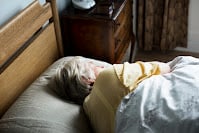About one in four cases of Alzheimer’s disease (AD) is misdiagnosed, according to a study published...
Longer, More Frequent Daytime Naps Linked to Worse Cognition, Alzheimer’s Disease

Numerous studies have identified a connection between excess sleepiness and Alzheimer’s disease. A study appearing in Alzheimer’s and Dementia now reports that adults who napped excessively were more likely to experience worse cognition in the future, and conversely, adults with poor cognition were more likely to nap excessively in the future.
“To the best of our knowledge, this is the first cohort study demonstrating a bidirectional link between objectively measured, excessive daytime napping and Alzheimer’s dementia or cognitive impairment,” wrote Peng Li, Ph.D., of Brigham and Women’s Hospital in Boston and colleagues.
Li and colleagues examined data from 1,401 adults with a mean age of 81.4 years who were part of the Rush Memory and Aging Project between 2005 and 2020. All the participants were given a special watch that measured their movement and sleep activity; the participants were also given comprehensive cognitive tests annually.
Overall, the participants took more daytime naps and longer daytime naps as they aged, but the yearly increase in the frequency and duration of their daytime naps varied with cognitive status. Adults with no cognitive impairment increased their napping by around 11 minutes a year, whereas adults with mild cognitive impairment increased their napping by 25 minutes a year, and adults with Alzheimer’s increased their napping by 68 minutes a year.
Longer naps were also linked with Alzheimer’s risk. For example, participants who napped more than one hour a day on average had a 1.4-fold increased risk of developing Alzheimer’s during the follow-up period compared with those who napped less than one hour a day. This association between excess daytime napping and incident Alzheimer’s dementia remained even after adjusting for differences in nighttime sleep quality and quantity.
“We further note that we did not observe direct associations between these nighttime sleep measures and incident Alzheimer’s dementia,” Li and colleagues wrote. “Therefore, it is unlikely that the increased duration and frequency of daytime napping were simply to compensate nighttime sleep loss.”
To read more on this topic, see the Psychiatric News article “Sleep Loss Found to Exacerbate Spread of Toxic Protein Associated With Alzheimer’s Disease.”
(Image: iStock/Willowpix)
Don't miss out! To learn about newly posted articles in Psychiatric News, please sign up here.






